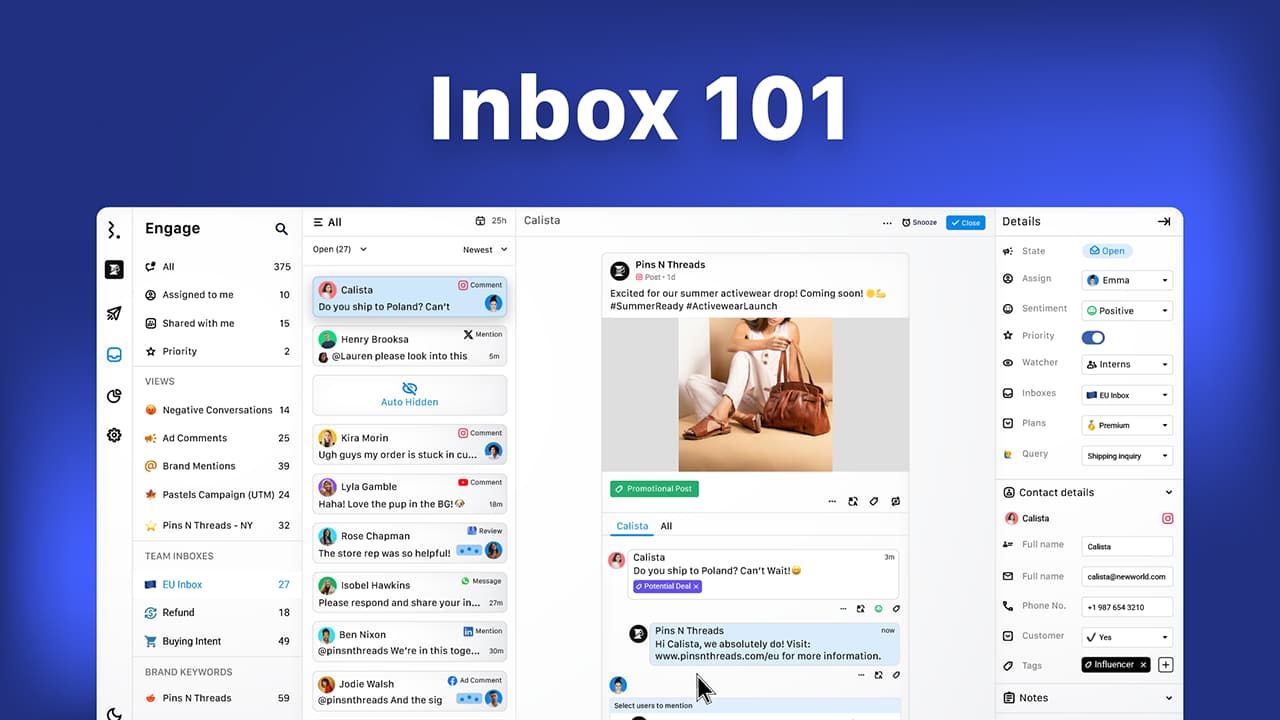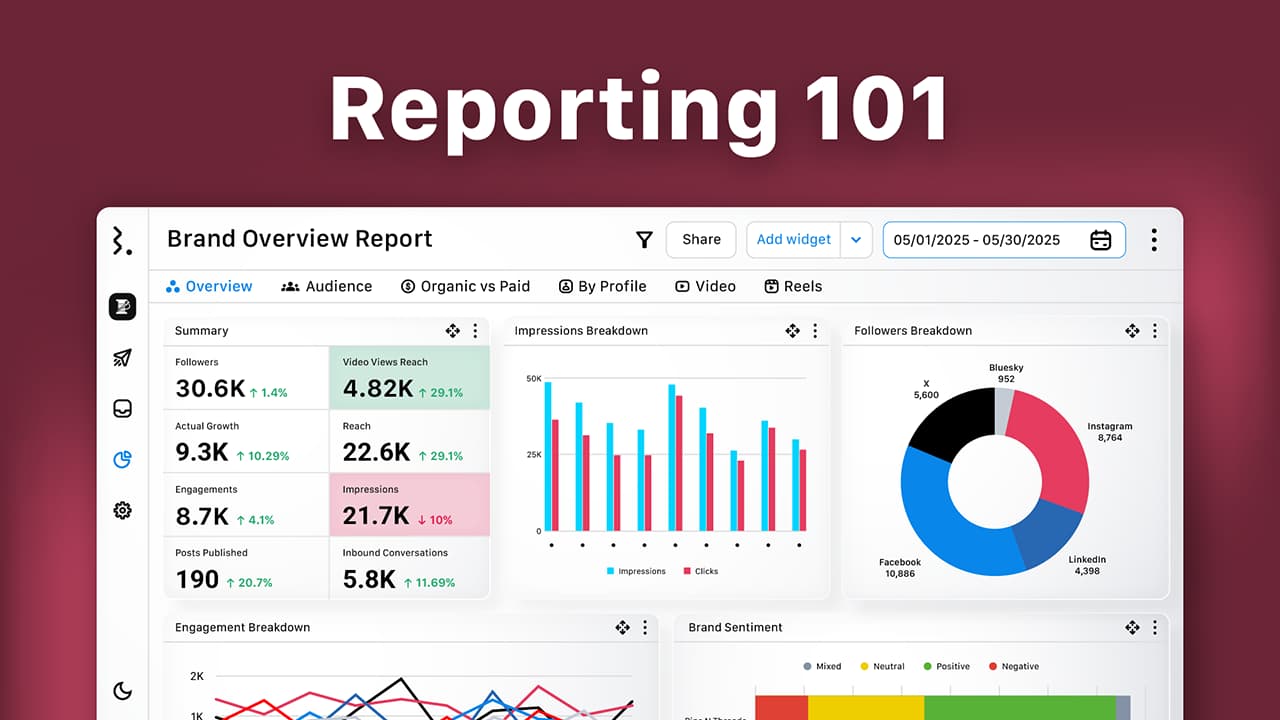Creating multiple Facebook pages breaks no sweat, but managing them raises the difficulty bar exponentially.
Whether you’re an agency handling Facebook Pages for multiple clients, or a franchise managing local branches, or a brand running sub-pages for different product lines, things can quickly get messy without the right tools.
If you are looking for a way to manage multiple pages, that means you aim to achieve one or all of the following:
Avoiding cross-posting mistakes
Keeping content planning and reporting organized
Managing engagements (organic & paid) across Pages
Maintaining centralized control without losing clarity
I get it; managing multiple pages can quickly get out of your hands. That’s why I wrote this guide: to help you bring order and ease to the process.
But before we get to the actual steps, let’s clarify the most confusing part: the difference between a Facebook account, a Profile, and a Page.
Blog Summary
Managing multiple Facebook Pages becomes confusing fast without the right structure—teams often face issues like cross-posting errors, missed messages, and inconsistent brand voice.
Meta Business Suite supports basic scheduling, messaging, and analytics, but lacks approval workflows, team collaboration features, and detailed filtering.
Facebook’s setup can be confusing: one account supports multiple profiles, and each profile can manage multiple Pages, but this doesn’t allow for scalable team permissions or page-level workflows.
Comparing performance across Pages is time-consuming, and Meta’s page-specific insights don’t offer unified or customizable views.
Managing comments across Pages—especially for ad campaigns—is hard to scale without bulk actions or automation in Meta’s native tools.
Brands and agencies often need features like calendar sharing, campaign tagging, role-based access, and advanced moderation tools to work efficiently at scale.
Statusbrew solves these gaps with workspace-level control, bulk publishing, 68+ automation rules, custom calendars, and detailed multi-page analytics with historical backfill.
Facebook Account vs Profile vs Pages
Facebook Account: Account will help you log in to Facebook.
Facebook Profile (Main and Additional): A main profile is your personal presence on Facebook. You can create additional profiles under the same account, each with a unique username, friend list, and feed.
Facebook Page: Pages are for public representation of a brand, business, public figure, or organization.
While some people refer to Pages as “accounts,” technically, Pages are assets tied to your account, not standalone logins.
In summary:
You can have only one Facebook account.
That account can have multiple profiles.
Those profiles can create or manage multiple Pages.
Why Managing Multiple Facebook Pages Feels Like Chaos?
Facebook’s native tools, like Meta Business Suite, lack advanced features such as multiple-step multiple user approval workflows, separate workspace for different clients/brands, or in-depth analytics.
Manually switching between Pages often leads to cross-posting mistakes, such as posting personal updates on client Pages or mixing up brand voices.
Managing multiple pages with several team members introduces workflow visibility and task allocation challenges.
Comments, messages, and mentions across multiple pages are spread thin across inboxes, which makes timely responses difficult, and important messages are bound to be overlooked.
Comparing performance across multiple Facebook pages is time-consuming and error-prone, as data is spread across different dashboards and timeframes.
How to manage multiple Facebook pages in Meta Business Suite?
Meta Business Suite is a free native tool that simplifies the management of multiple Facebook Pages and associated Instagram accounts.
Grouping Pages under a Business Portfolio makes organizing and managing multiple pages from the Meta Suite dashboard easier.
You can assign role-based permissions to your team members, with either partial or full access to a Business Portfolio.
Meta Business Suite offers a Planner tool for creating, drafting, and scheduling posts, Stories, Reels, and ads.
Meta Business Suite also consolidates direct messages and comments across all connected Facebook, Instagram, and WhatsApp accounts in the Inbox.
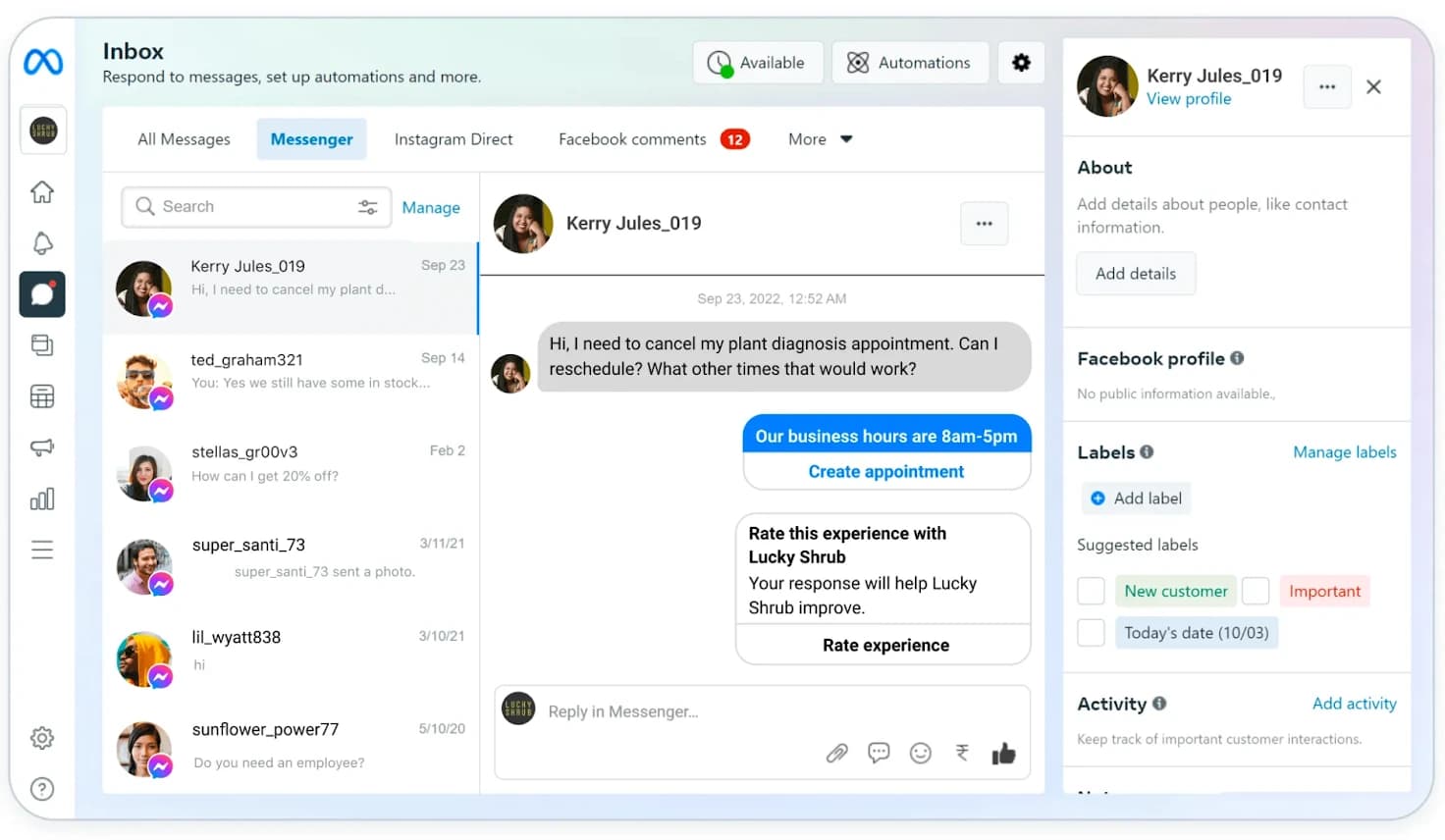
When dealing with a high volume of messages across pages, filters in the Inbox let you focus on the conversations that matter most.
It supports a few inbox filters, such as unread messages, ad responses, labels, and messages marked as important, done, follow-up, and spam.
However, Business Suite does not support combining filters using logical operators to precisely segment and prioritize conversations across Pages.
Analytics are page-specific under the Insights tab to analyze basic metrics like Page views, reach, content interactions, follows, and audience demographics.
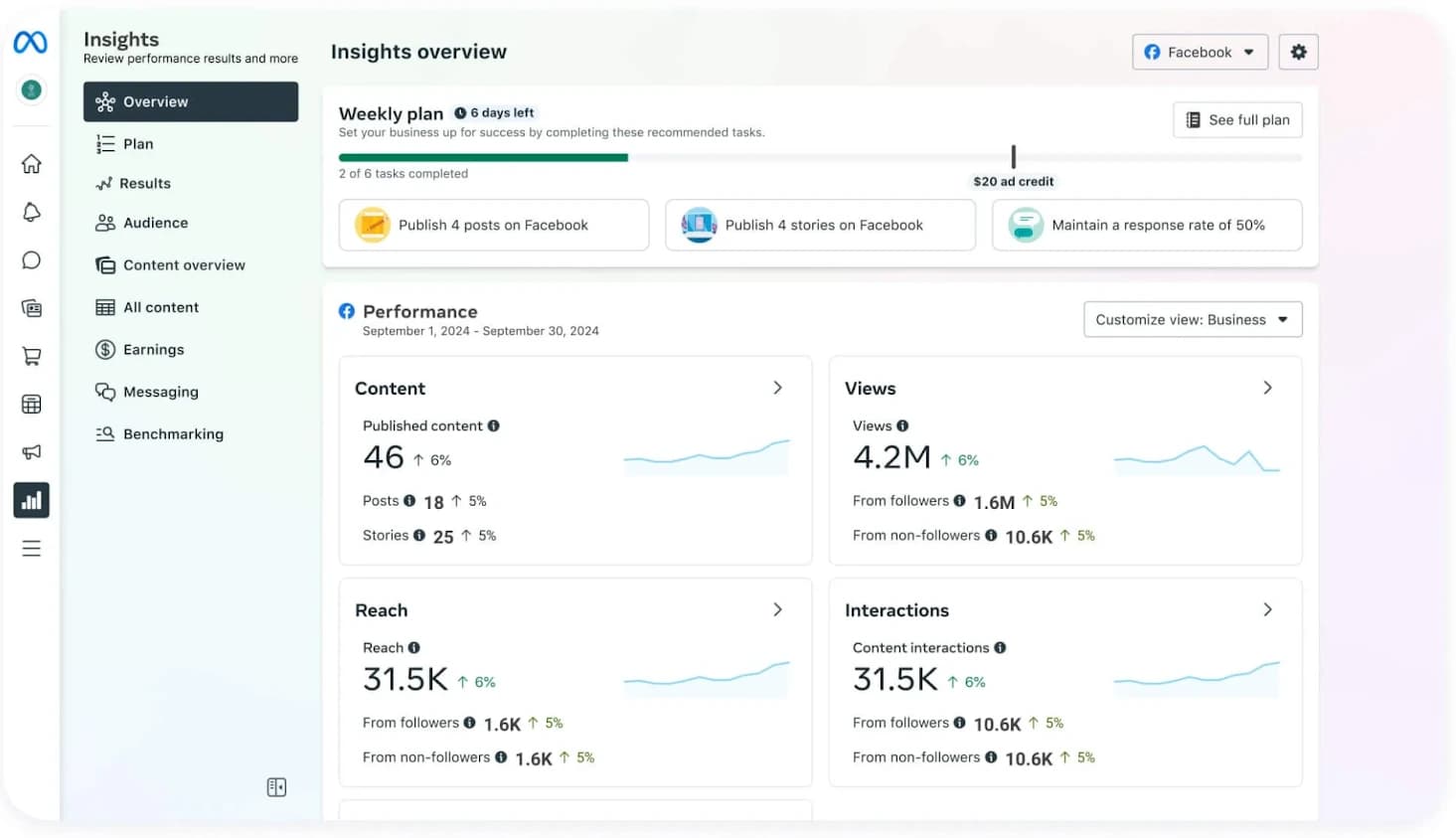
Suite provides the foundational tools needed to manage multiple Facebook pages.
However, as your team grows or the number of Pages you manage increases, these basic features will fall short.
Challenges of managing multiple Facebook Pages in Meta Business Suite
Since Meta Business Suite is confined to Facebook and Instagram, users managing social media across other networks must rely on separate tools.
Facebook Pages must be linked to a single account for unified access. Without Page-level segmentation, planning gets harder as the number of managed Pages increases.
Meta Business Suite lacks structured approval workflows, offering only basic role permissions.
offers minimal functionality for team collaboration, with no support for internal notes or the ability to assign conversations.
The analytics are quite basic and available page-wise.
Lacks a centralized dashboard for campaign planning, execution, and performance tracking.
How to manage multiple Facebook accounts in Statusbrew?
Statusbrew is a centralized platform for managing multiple accounts, focusing on simplifying publishing, engagement, and reporting across pages.
Reasons why Statusbrew is better than Meta Suite:
Unlike Meta suite (Facebook & Instagram), Statusbrew offers managing 10+ social media networks from a single hub.
Ability to plan & schedule posts across multiple Facebook pages and exceed Meta’s 29-day limit.
A unified inbox to manage comments, messages, mentions, and reviews from one place, with the fastest inbox experience.
Ability to moderate Facebook organic & ads comments at scale with bulk actions and over 68+ advanced automation rules.
In-depth paid and organic analytics, including historical data backfill for up to 18 months.
You begin by connecting all Facebook Pages where you hold admin permissions.
You can create workspaces for different clients, business units, or locations in order to keep each brand’s data, workflows, and team access separate and secure.
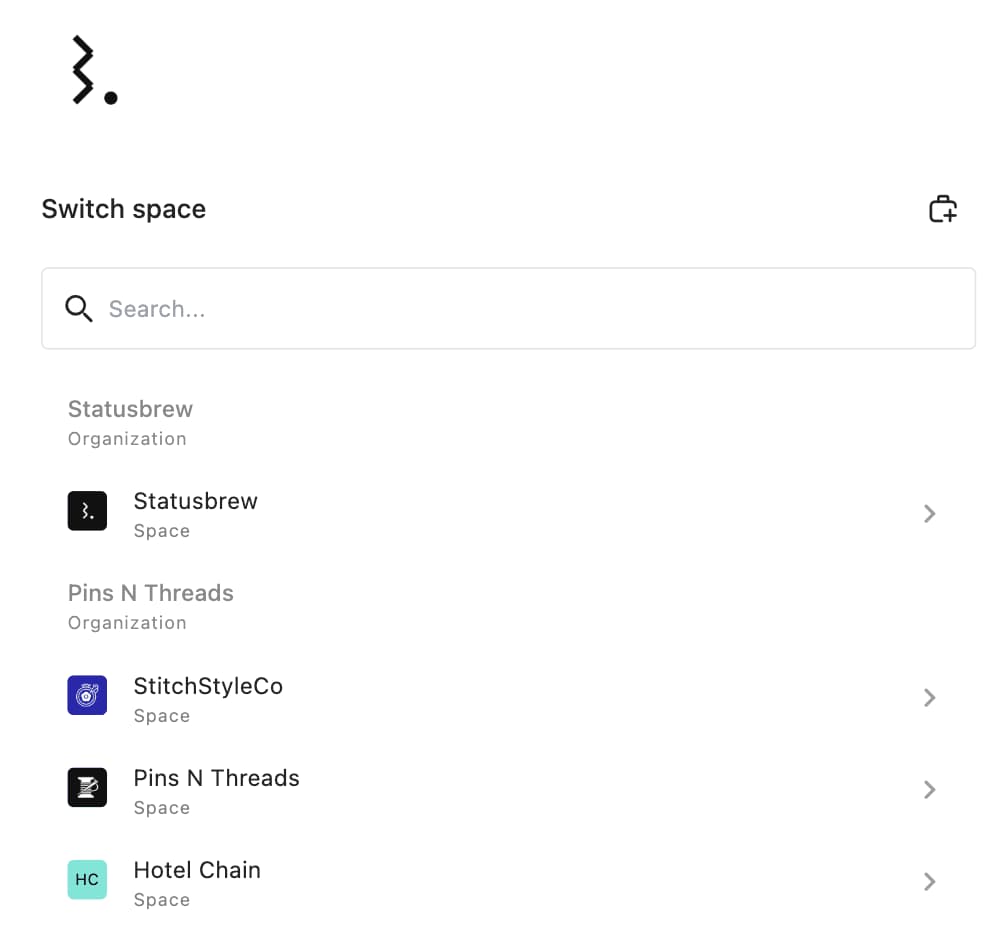
User grouping simplifies access management by allowing permissions to be assigned to entire teams rather than configuring access individually for each user.
In contrast, Meta Business Suite lacks user grouping.
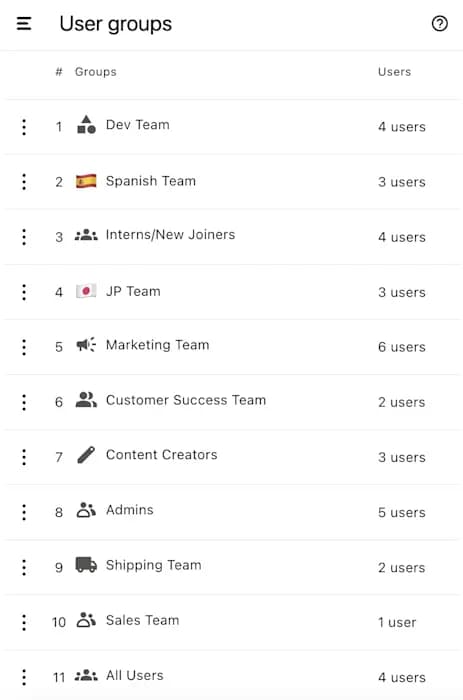
Users can plan, create, and schedule posts across multiple Facebook Pages simultaneously.
You can bulk schedule 400 posts up to 12 months in advance.
But, with Meta Business Suite, you can schedule posts (or bulk schedule) only upto 29 days.
Statusbrew also provides suggestions for optimal posting times based on your audience's activity patterns over the last 180 days to help maximize reach and engagement.
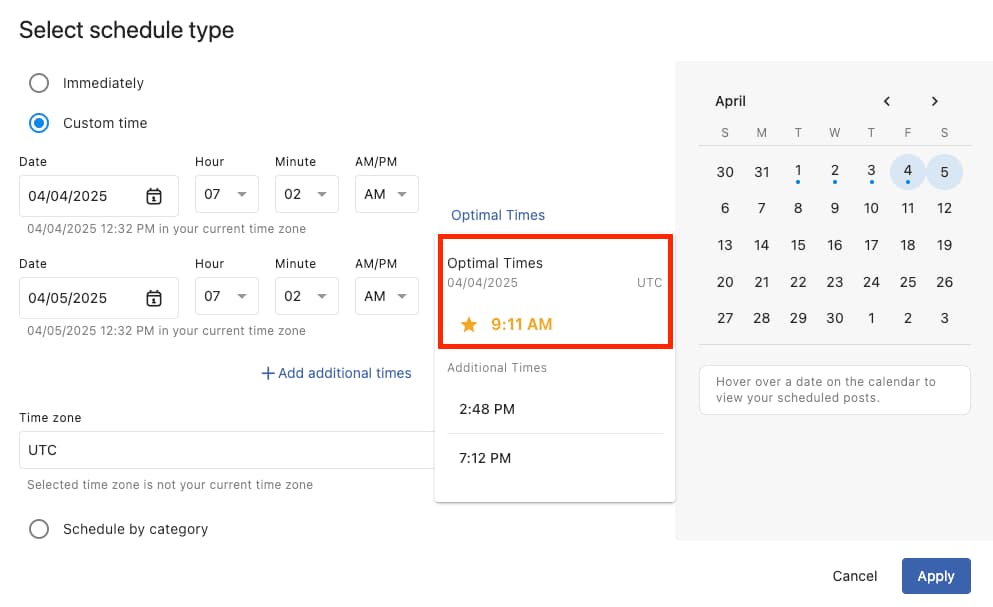
Meta Business Suite does that for 7 days only.
You can also create multi-user, multi-step approval workflows customized to your internal team’s structure so that every content is thoroughly reviewed and approved before publishing and to prevent off-brand or incorrect posts from being published.
External Approvers, who don’t need a Statusbrew login or user seat to view the scheduled content, provide feedback, and approve or reject posts.
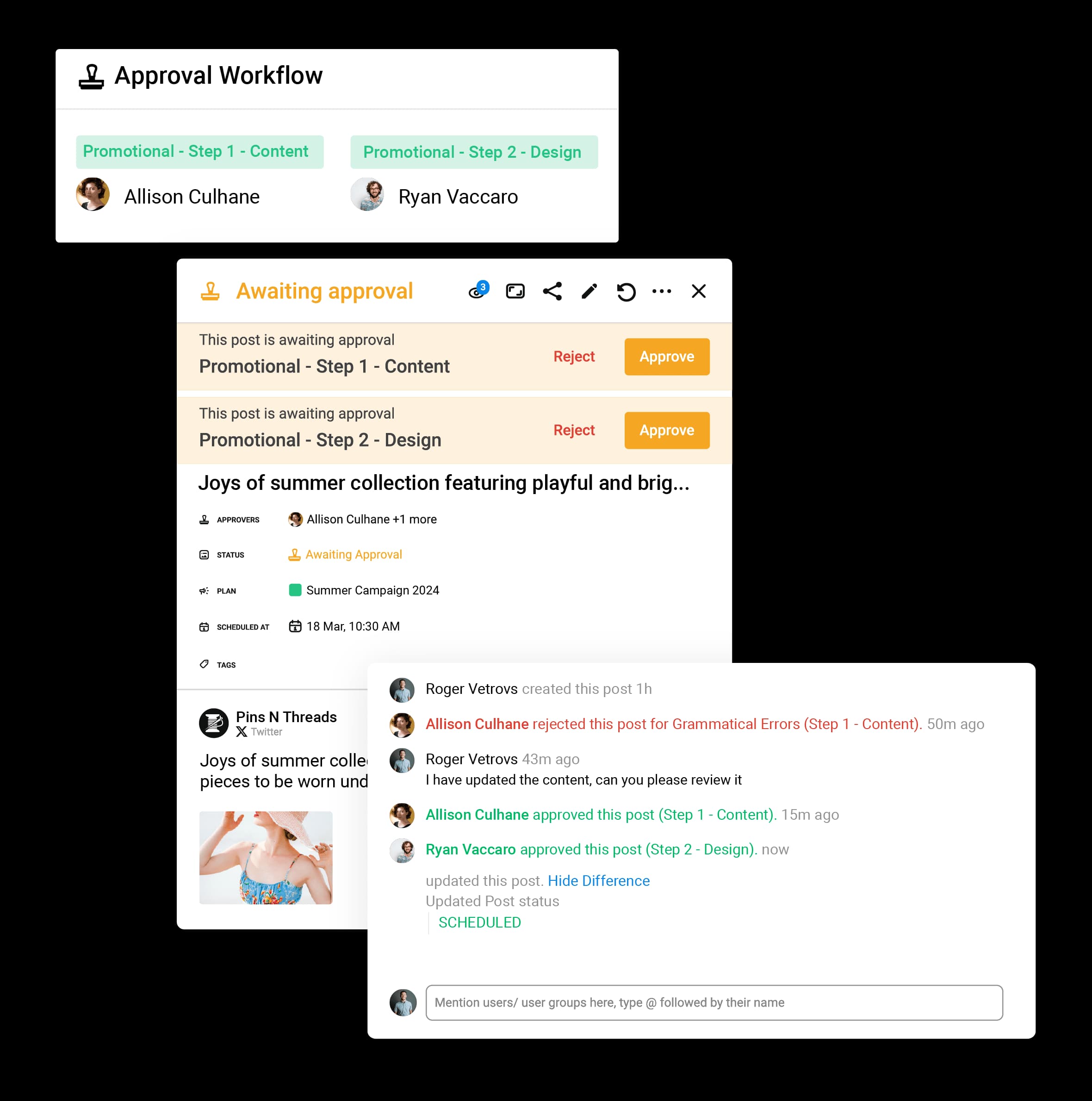
With Publish Rules, you can ensure that all outgoing content aligns with brand guidelines and reduce the risk of off-brand posts being published.
Meta Business Suite lacks this capability.
Filtering in Statusbrew goes further than Meta Suite.
Suite’s Planner can only be customized by:
Content types (post, Story, Reel, ad)
Platform (Facebook Pages, Facebook Groups, Instagram accounts)
Statusbrew offers granular filters, such as the ability to filter posts by each Page, post status, campaign progress, and labels that can also be combined.
Unlike the unified calendar in Meta Suite, you can create multiple boards tailored to different teams, clients, or content types and filter by social profiles, post types, or approval status.
Here’s how you can create a Planner Board in Statusbrew:
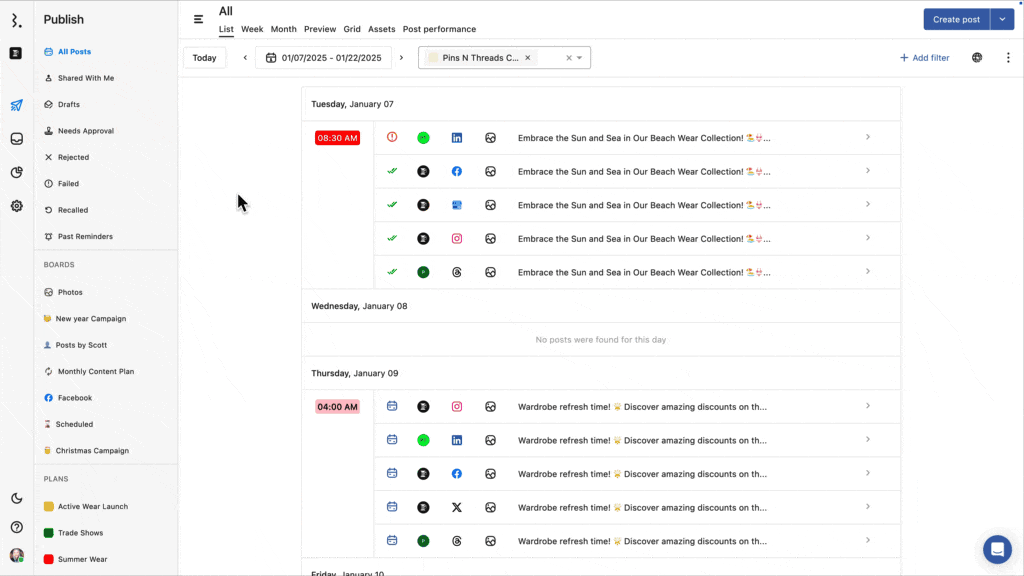
You can also extend the visibility and collaboration beyond the platform with Shareable Calendars.
You can generate a link to the calendar to share with your internal teams or external clients and customize the view to control precisely what information they can access.
External users can view scheduled posts, leave comments, and suggest edits.
This makes client approvals and cross-functional collaboration without requiring extra seats.
Statusbrew also offers an Engage Inbox, where comments, ad comments, messages, mentions, and reviews across all connected Facebook Pages appear in a single view.
When managing a high volume of engagement across pages, you can create separate inboxes to segment incoming messages.
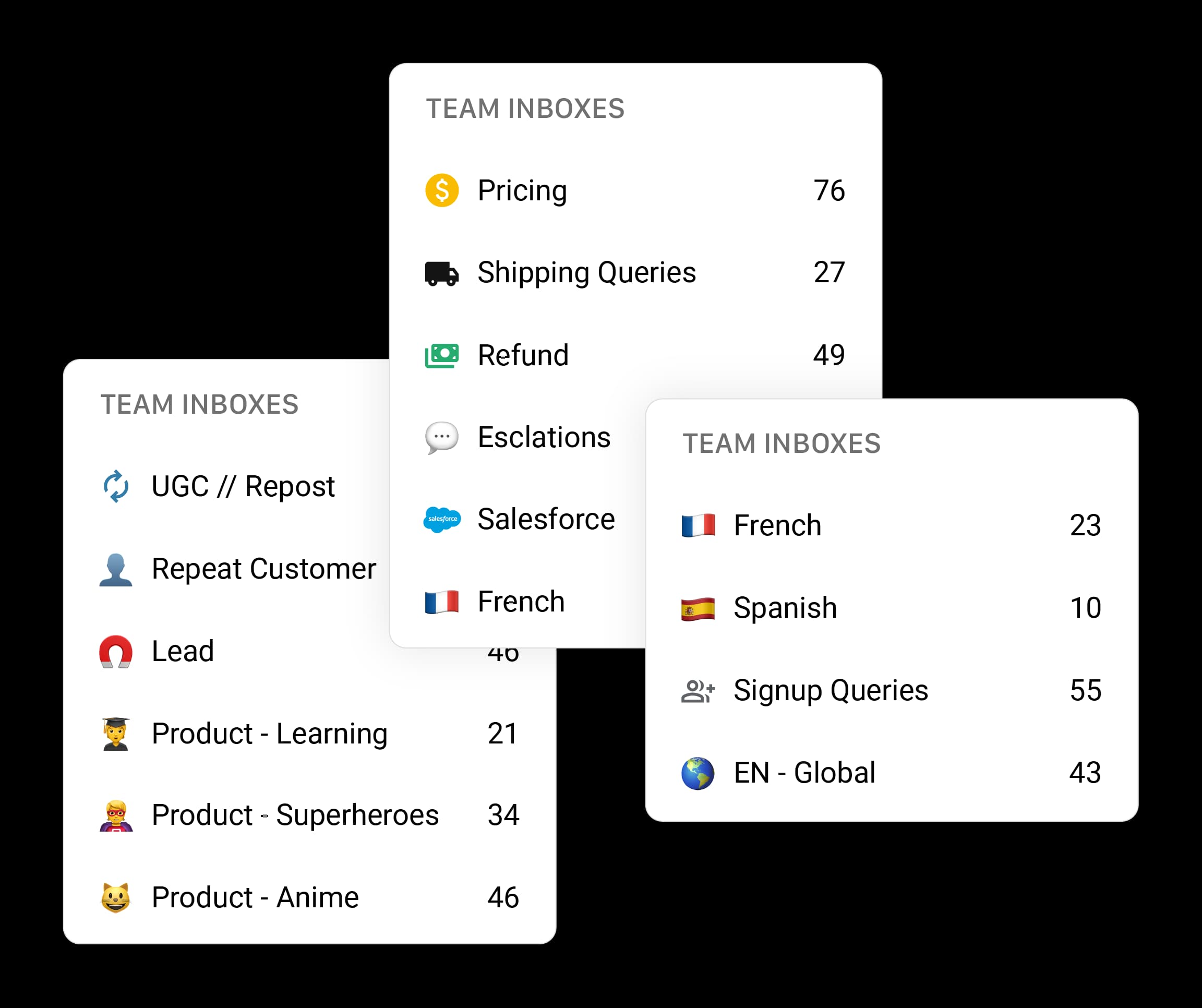
In contrast, Meta Business Suite offers limited filtering options.
Type (e.g., Facebook comments, Instagram comments, Messenger, WhatsApp)
Conversation status (Unread, Done, Follow-up, Spam)
Labels
Those marked as Important (automatically detected by Meta)
Statusbrew, however, offers over 25 advanced filtering criteria that can be combined using logical operators ("OR," "AND," "=", ">", "<", etc.) to organize and prioritize both previous and upcoming conversations.
You can assign conversations to specific team members and even leave internal notes on individual conversations to give your team context.
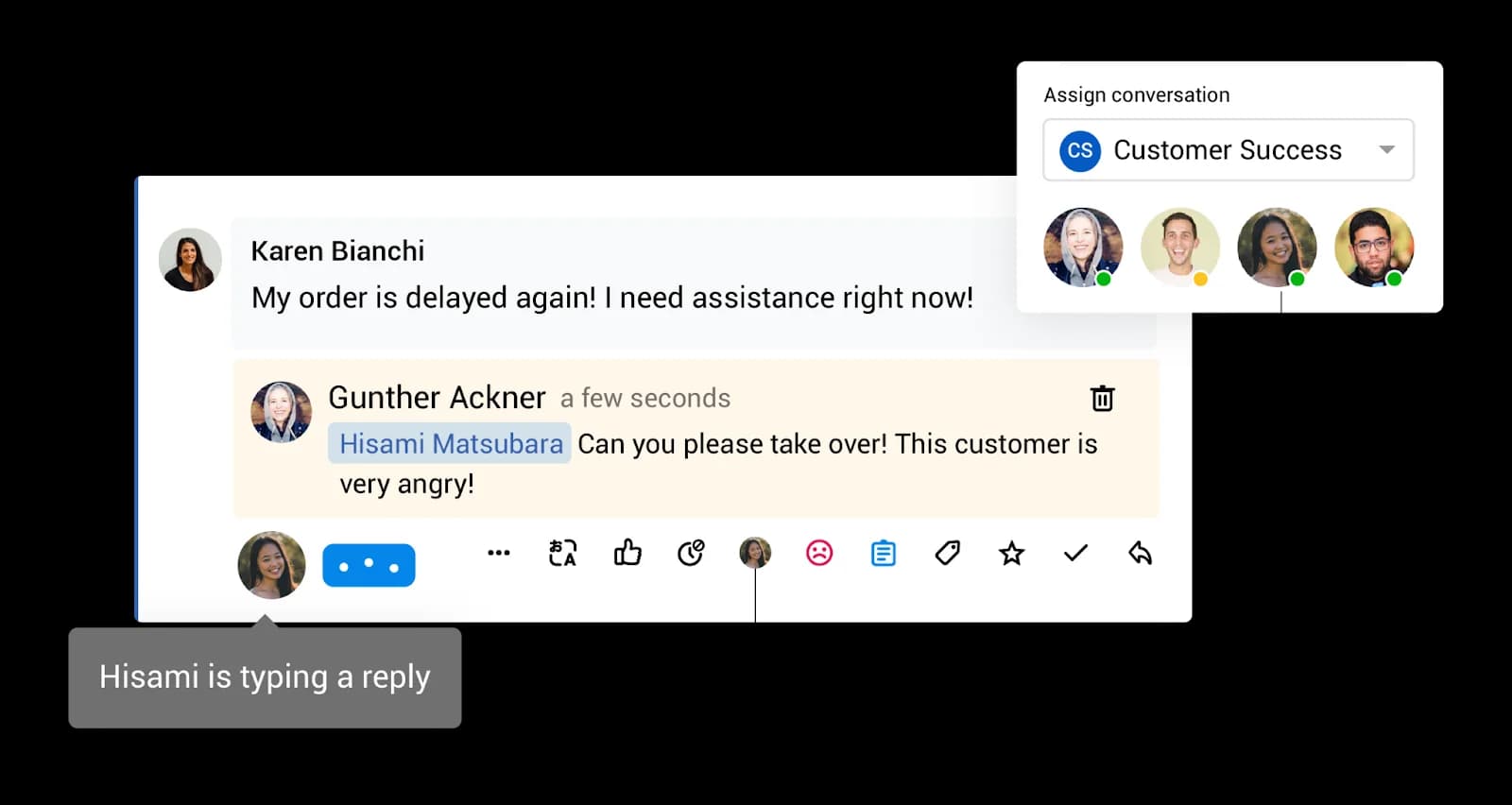
Moderation at scale is simplified within Statusbrew.
You can quickly hide or delete one or even 4,000 comments at once with a single click.
While Meta Suite provides only basic automation, Statusbrew offers over 68+ advanced automation options for managing and moderating Facebook comments and messages.
This way, you can improve the ROI of your ad spend by automating tasks such as:
Hiding ad comments with negative sentiment
Deleting Facebook ad comments that contain external links or attachments
Hiding or deleting conversations that contain only mentions with no accompanying text
Our detailed guide on How to Manage & Moderate Facebook Ad Comments? will teach you how to boost ad performance by mastering Facebook ad comment moderation.
While Meta Business Suite provides only basic analytics, Statusbrew offers access to detailed paid and organic analytics.
Reports can be scheduled, shared with controlled access (including lockable date ranges, expiry settings, and selective metric visibility), and downloaded as PDFs.
Statusbrew also supports historical data backfill for up to 18 months to eliminate your migration concerns.
Try Statusbrew free for 14 days and simplify the way you manage multiple Facebook Pages, even at scale.
META Suite vs Statusbrew Comparison
Feature/Aspect | Statusbrew | Meta Business Suite |
Platforms Support | Facebook, Instagram, WhatsApp, Threads, TikTok, X, LinkedIn, Bluesky, YouTube, Pinterest, Google Business | Facebook, Instagram, WhatsApp (only Inbox) |
Workspaces | ✅ | ❌ |
Profile grouping and user grouping | ✅ | Profile grouping is available as business portfolios, but lacks user grouping |
Bulk schedule post types supported | Text posts, image posts, GIFs, and even video posts | Video posts and Reels |
Scheduling window | upto 400 days | upto 29 days |
Bulk schedule post count limit | 400 | 50 |
Posting time suggestions | Optimal Posting Time Suggestions Based on audience activity over 180 days | Active times suggestions based on the last 7 days of follower activity |
Content Approval Workflows | Single/Multi-user, multi-step approval workflows | ❌ |
Publish Rules | ✅ | ❌ |
Content Filtering Options | 8+ | 2 |
Shareable Calendars | ✅ | ❌ |
Inbox Filtering Options | 16+ | 4 |
Conversation Assignment & Internal Notes | ✅ | ❌ |
Bulk Moderation | Hide/delete up to 4,000 comments at once | ❌ |
Engagement Automations | 68+ | 9 |
Reporting templates | 20+ | 9 |
Ability to customize the report | ✅ | ❌ |
Schedule Reports | ✅ | ❌ |
Controlled report access | Lockable date ranges, expiry settings, and selective metric visibility | ❌ |
Conclusion
Managing multiple Facebook Pages can be time-consuming.
You can structure, clarify, and optimize your publishing, engagement, and reporting workflows with the right approach and tool.
Meta Business Suite works well for basic needs, but if you’re managing multiple Facebook pages with larger teams or complex workflows, Statusbrew offers a more structured and scalable solution.
FAQs
What tools can help manage multiple Facebook Accounts?
Apart from Meta Business Suite, several third-party tools can help to manage multiple Facebook accounts, such as Statusbrew, Sprout Social, Hootsuite, or Agorapulse.
If one Facebook Page is disabled, will other Pages under the same account also be affected?
If a Page is disabled, it doesn't automatically affect other Pages you manage. However, if your personal profile or Business Manager account is restricted, all associated Pages may be impacted.
How can I manage spam comments across multiple Facebook Pages in bulk?
Facebook doesn’t offer a built-in way to hide or delete spam comments in bulk across multiple Pages. However, tools like Statusbrew make this possible through a unified inbox to perform bulk actions, such as hiding or deleting comments, across multiple conversations.
How do I organize content for multiple Facebook pages?
While Meta Business Suite offers basic scheduling and a shared content calendar, tools like Statusbrew provide more structure and flexibility to organize content for multiple Facebook Pages.
You can plan and schedule content across multiple Pages from one dashboard, use a shared content calendar to view all posts at a glance, filter and categorize posts by campaign, tag, or objective, or even assign approval workflows if you’re working with a team.
Is there a reporting tool to track performance across multiple Facebook Pages from one unified platform?
Yes, tools like Statusbrew, Sprout Social, and Hootsuite allow you to view analytics for multiple Facebook Pages from one place. You can track key metrics such as reach, engagement, follower growth, and post performance across all your Pages.
